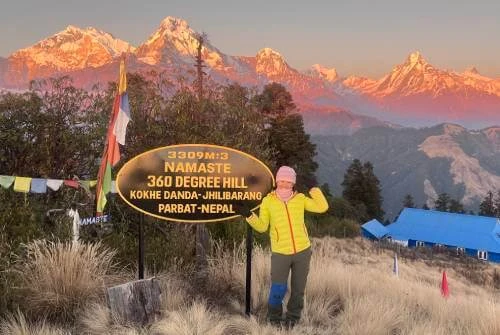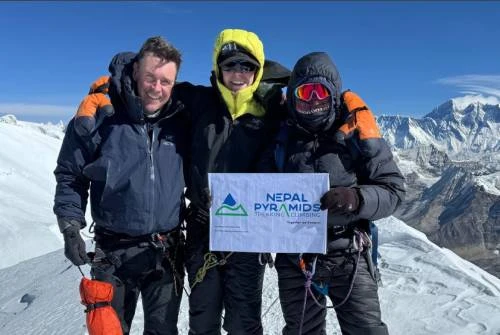Trekking is an adventure sport that is gaining popularity around the world. It involves walking on footpaths or trails, often in the mountains or remote areas. Trekking requires physical fitness, mental strength, and endurance. Trekking in Nepal is a popular activity among adventurers and nature lovers from around the world. However, it is not uncommon for trekkers to encounter various medical issues during their journey. These common medical issues include altitude sickness, dehydration, injuries, gastrointestinal problems, and altitude-related eye problems. It is, therefore, essential to be aware of these medical challenges and to be prepared to deal with them. This can be done by carrying a first aid kit, staying hydrated, eating light and nutritious food, maintaining proper hygiene, and acclimatizing properly. By taking these precautions, trekkers can ensure a safe and enjoyable trekking experience.
Common Medical Issues While Trekking and Their Prevention
Table of Contents
Common Medical Issues While Trekking and Their Prevention:
- First and foremost, ALTITUDE SICKNESS (AMS - ACUTE MOUNTAIN SICKNESS) is a common medical issue that trekkers face while trekking. It occurs when one ascends to high altitudes rapidly without proper acclimatization. The symptoms of altitude sickness include headache, nausea, dizziness, shortness of breath, and fatigue. In severe cases, it can lead to cerebral or pulmonary edema, which can be life-threatening.
Proper acclimatization is very crucial to prevent altitude sickness. This can be done by ascending gradually and allowing the body to adjust to the altitude. It is also advisable to stay hydrated, avoid alcohol and smoking, and eat light and nutritious food.
DIAMOX - ACETAZOLAMIDE: 1 Tablet 250mg
Acetazolamide can be taken for the prevention of Altitude Sickness. Always bear in mind that Diamox doesn’t cure Altitude Sickness but can only be taken for prevention. Subsequently, as a precaution, you can take 1 tablet 250mg from the elevation of 3500m and above every morning after breakfast. This medication should not be given to a person who is allergic to SULFA drugs.
But do remember that Descending is the only good option to treat or cure when the person has AMS.
The difficult decision is when someone has had mild or moderate symptoms and insists on continuing the trek. If they recover rapidly at a lower altitude they may try to re-ascend a day or two later using Diamox.
- Secondly, DEHYDRATION is another medical issue that trekkers face while trekking. Dehydration occurs when there is a loss of water and electrolytes from the body. The symptoms of dehydration include thirst, dry mouth, fatigue, dizziness, and dark urine.
To prevent dehydration, it is essential to drink plenty of water and electrolyte-rich fluids like ORS (oral rehydration solution) regularly. It is also advisable to avoid alcohol and caffeine, which can cause dehydration.
- Thirdly, INJURIES are another common medical issue that trekkers face while trekking. Injuries can range from minor cuts and bruises to fractures and dislocations. It is, therefore, essential to carry a first aid kit that contains essential medical supplies like bandages, antiseptics, painkillers, and splints.
In case of a minor injury, it is advisable to clean the wound with antiseptic and cover it with a bandage. In case of a major injury, it is essential to seek medical help immediately.
- Fourthly, GASTROINTESTINAL PROBLEMS are another medical issue that trekkers face while trekking. These include diarrhea, constipation, and indigestion. These issues can be caused by a change in diet, water, or environmental factors.
To prevent gastrointestinal problems, it is essential to maintain proper hygiene and to eat light and nutritious food. It is also advisable to carry water purification tablets and to avoid eating raw or uncooked food.
- Lastly, ALTITUDE RELATED EYE PROBLEMS are another medical issue that trekkers face while trekking. These include snow blindness, cataracts, and glaucoma. These issues are caused by exposure to ultraviolet (UV) rays at high altitudes.
To prevent altitude-related eye problems, it is essential to wear sunglasses that offer UV protection. It is also advisable to wear a hat or a cap that covers the face and eyes.
When going trekking, it's always a good idea to carry a small medical kit to help you deal with minor injuries and illnesses that may occur.
Here are some essential medicines to carry while trekking:
- PAINKILLERS: Aspirin, ibuprofen, and acetaminophen can help relieve pain from headaches, muscle aches, and minor injuries.
- ANTIHISTAMINES: These can be used to treat allergic reactions, insect bites, and stings.
- ANTI-DIARRHEA MEDICATION: Diarrhea can be a common problem while trekking, so it's a good idea to carry anti-diarrhea medication like Loperamide.
- ANTISEPTIC CREAM: This can be used to clean and disinfect minor cuts, scrapes, and burns.
- ELECTROLYTES: These can be used to rehydrate your body in case of dehydration due to diarrhea or sweating.
- BAND-AIDS AND GAUZE PADS: These can be used to cover minor cuts and scrapes.
- SUNSCREEN: Protect your skin from harmful UV rays by carrying sunscreen with a high SPF.
- INSECT REPELLENT: Keep insects and mosquitoes at bay by carrying an insect repellent.
- WATER PURIFICATION TABLETS: These can be used to purify water from streams and rivers while trekking.
It's important to note that while these medicines can be useful, any of these medications mentioned here should be used under the guidance of a medical professional. If you have any pre-existing medical conditions, it's always a good idea to consult with your doctor before going trekking.
ANTIBIOTICS
It is not necessary to take antibiotics while going outdoors unless you have a pre-existing medical condition that requires you to take them. Antibiotics are not effective against viral infections like the common cold or flu, so taking them as a precautionary measure when going outdoors is not recommended.
If you have a medical condition that requires you to take antibiotics, make sure to follow your doctor's instructions on how and when to take them. It's also important to complete the entire course of antibiotics as prescribed, even if you start feeling better before you've finished all the medication.
Commonly prescribed antibiotics for bacterial diarrhea include:
CIPROFLOXACIN:
This is a broad-spectrum antibiotic that is effective against a wide range of bacterial pathogens that cause diarrhea.Can be useful for wounds, skin, kidney, or chest infections if necessary. And in Typhoid fever.
AZITHROMYCIN AND ERYTHROMYCIN:
This is another broad-spectrum antibiotic that is often used to treat bacterial diarrhea. They are very good medication for throat infections, especially tonsillitis. When a person is allergic to PENICILLIN you can use these antibiotics. They are also used for wounds and skin infections. Also used for infected cuts, blisters, leech or dog bites, and chest infections as well. Erythromycin is widely used in patients with penicillin and Quinolone allergy.
METRONIDAZOLE:
This is an antibiotic and antiprotozoal medication that is used to treat a variety of infections caused by bacteria and parasites. Here are some common uses of metronidazole:
- Bacterial infections: Metronidazole is effective against a range of bacteria, including those that cause infections in the stomach, intestines, skin, and reproductive system.
- Protozoal infections: Metronidazole is also effective against protozoal infections such as giardiasis, trichomoniasis, and amoebiasis.
- Dental infections: Metronidazole is sometimes used to treat dental infections, particularly those caused by anaerobic bacteria.
- Helicobacter pylori infection: Metronidazole is often used in combination with other antibiotics to treat infections caused by Helicobacter pylori bacteria, which can cause stomach ulcers.
- Inflammatory bowel disease: Metronidazole may be used to reduce inflammation in the gut in people with inflammatory bowel disease.
AMOXICILLIN:
This is a broad-spectrum antibiotic that belongs to the penicillin class of antibiotics. It is commonly used to treat bacterial infections such as ear infections, urinary tract infections, strep throat, and pneumonia.
FOOD POISONING:
Food Poisoning is considered one of the main reasons why thousands of trekkers don't make it to their desired destination while trekking in Nepal. It is said that more than 40% of the tourist have to abort their adventure trips in Nepal due to food poisoning. Furthermore, multiple times this illness is mistaken as Altitude sickness, and trekkers are either sent back or rescued. Food poisoning, also known as foodborne illness, is an illness caused by consuming contaminated food or drinks. Also caused by changes in diets and adapting to new diets. It can be caused by various types of bacteria, viruses, parasites, and toxins. Symptoms of food poisoning can range from mild to severe and include nausea, vomiting, diarrhea, stomach cramps, fever, and dehydration.
To prevent food poisoning, it's important to practice good food safety habits such as washing your hands thoroughly before handling food, cooking meat and poultry to the correct internal temperature, avoiding cross-contamination by using separate cutting boards for meat and produce, and storing food properly in the refrigerator.
If you suspect that you have food poisoning, it's important to seek medical attention, especially if your symptoms are severe or last for more than a few days. Treatment may include rehydration, medication for symptoms such as nausea and vomiting, and in some cases, antibiotics.
TREATMENT FOR FOOD POISONING:
- Abdominal cramps with vomiting followed by diarrhea:
Don’t treat the victim instantly let the patient get rid of all the solids – when the stomach is empty –
- Treat the patient with Electrolite (Jeevan Jal) with one or two antacids ( Digene or any other antacid on an empty stomach).
- No food till the next 24 hours instead don’t stop giving the patient ORS.
- Give Stemetil if vomiting continues. If severe diarrhea develops treat it with antibiotics – like Ciprofloxacin or Metronidazole.




